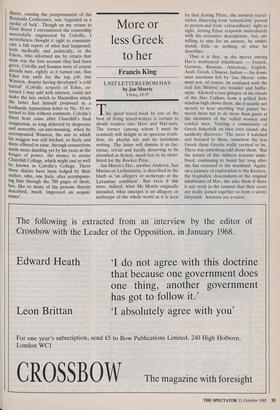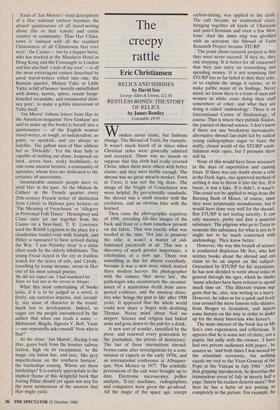More or less Greek to her
Francis King
LAST LETTERS FROM HAV by Jan Morris
Viking, £8.95
This spoof travel book by one of the best of living travel-writers is certain to divide readers into Hays and Hav-nots. The former (among whom I must be counted) will delight in its specious erudi- tion, its playful wit and its fastidious writing. The latter will dismiss it as fac- etious, trivial and hardly deserving to be classified as fiction, much less to be short- listed for the Booker Prize.
Jan Morris's Hay, another Andorra, San Marino or Lichtenstein, is described in the blurb as 'an allegory or archetype of the Levantine condition'. But even if this were, indeed, what Ms Morris originally intended, what emerges is an allegory or archetype of the whole world as it is seen by that Jesting Pilate, the modern travel- writer. Hurrying from 'remarkable' person to person and from 'extraordinary' sight to sight, Jesting Pilate responds immediately with his evocative descriptions, but, un- willing to stay for an answer, he under- stands little or nothing of what he describes.
Thus it is that, as she moves among Hav's multiracial inhabitants — French, German, Russian, American, English, Arab, Greek, Chinese, Indian — the domi- nant emotions felt by 'Jan Morris' (who must not, of course, be confused with the real Jan Morris) are wonder and baffle- ment. Allowed a rare glimpse of the rituals of the Hay Cathars from a grilled little window high above them, she is unable not merely to hear anything that passes be- tween them but to do more than guess at the identities of the veiled women and cowled men. Visiting a community of Greek fisherfolk on their little island, she suddenly discovers: 'The more I watched and listened to them, somehow the less Greek those Greeks really seemed to be. There was something odd about them.' But the nature of this oddness remains unde- fined, continuing to haunt her long after she has returned to the mainland. Again, on a journey of exploration to the Kretevs, the troglodyte descendants of the original inhabitants of Hay, she asks them if there is any truth in the rumour that their caves are really joined together to form a secret labyrinth. Answers are evasive. Each of `Jan Morris's' vivid descriptions of a Hav national enclave becomes the absurd quintessence of all travel-writing about this or that remote and exotic country or community. Thus Hay China- town is 'imbued with all the standard Chineseness of all Chinatowns that ever were'; the Casino — run by a dapper Swiss, who has worked at the Mandarin Hotel in Hong Kong and the Connaught in London and has also had 'a pub of my own' — is all the most extravagant casinos described by awed travel-writers rolled into one; the Russian quarter, Malaya Yalta or Little Yalta, is full of houses 'merrily embellished with domes, turrets, spires, ornate barge- boarded verandahs, and ornamental chim- ney pots', to make a goblin microcosm of Yalta itself.
`Jan Morris' (whose letters from Hav to the American magazine 'New Gotham' are said to make up the book) is herself also a quintessence — of the English woman travel-writer, so tough, so independent, so game, so sparkish, and yet always so ladylike. The gallant men of Hay address her as Dirleddy'. Yet the dear lady is capable of striding out alone, knapsack on back, across bare, rocky heathlands, to visit some ancient hermits, a community of agnostics, whose lives are dedicated to the certainty of uncertainty.
Innumerable eminent people have vi- sited Hav in the past. At the Maison de Culture in the French quarter every 20th-century French writer of distinction from Colette to Malraux gave lectures on `The Meaning of Frenchness' or 'Allegory in Provengal Folk Dance'. Hemingway and Ciano once set out together from the Casino on a bear-hunt, T. E. Lawrence used the British Legation as the place for a clandestine rendez-vous with Ataturk, and Hitler is rumoured to have arrived during the War. 'I saw Nijinsky clear' is a claim often made by the elderly inhabitants. The young Freud stayed in the city in fruitless search for the testes of eels, and Cavafy, travelling by tramp steamer, wrote in Hav one of his most sensual poems: He did not expect me. I had wandered far Since we had met in the tavern in Aleppo . .
What this most entertaining of books lacks, if it is to be judged as a novel, is firstly, any narrative impetus, and, second- ly, any sense of character in the round, much less in development. Indeed, so vague are the people encountered by the author that when one reads a name — Mahmoud, Magda, Signora V, Bob, Yasar — one repeatedly asks oneself 'Now who is that?'
At the close, 'Jan Morris', fleeing from Hav, gazes back from the frontier railway station, high on its escarpment, to the magic city below her, and sees, 'like grey imperfections on the southern horizon', the battleships coming. Whose are these battleships? It is entirely appropriate to the implicit theme of this delightful book that Jesting Pilate should yet again not stay for the most momentous of the answers that Hav might yield.























































 Previous page
Previous page